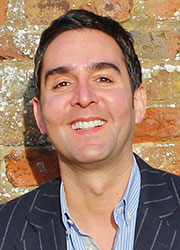 Mr Miguel Toribio-Mateas
Mr Miguel Toribio-Mateas
A leader in his field, Miguel is a nutrition clinician, researcher and lecturer with postgraduate education in Systems Complexity, Nutritional Medicine and Clinical Neuroscience. Miguel is Board Certified in Anti-Ageing, Functional Medicine and Regenerative Nutrition (ABAAHP) and practises Personalised Nutrition in London, although many of his patients come to see him from much further afield. Miguel’s current research is on neuroprotection, working with neural stem cells at the Clinical Neuroscience lab at Roehampton University in London. Miguel is also well known for this role as Chairman of the British Association for Applied Nutrition and Nutritional Therapy, BANT.
2016 - Food as information for the epigenome: neuroprotective nutritional strategies that help us keep our brain young
In light of recent research around functional medicine and nutrigenomics, the role of nutrition in human health is seen to go much farther than sheer, simplistic calories in and calories out theory. Nutritional inadequacies and deficiencies are linked with the generalised development of disease, as shown by a growing number of epidemiological studies on the role of vegetables, fruits and other nutrient-rich foods such as oily fish and even red wine. Diet is intertwined with human evolution and genetics, and an overwhelming body of evidence documents the mechanisms whereby food is "information for the epigenome". A variety of nutrients are able to modulate cell health status, including vital functions such as apoptosis, detoxification, and appropriate gene response, all of which are key for effective neuroprotection, and particularly for the prevention of cognitive decline.
Mr Toribio-Mateas will explore the evidence for the role and efficacy of a number of nutritional supplements (such as folate, vitamin B12, alpha-lipoic acid, melatonin) and metabolic compounds (such as nicotinamide, acetyl-l-carnitine, creatine, coenzyme Q10, vitamin D), minerals (zinc, selenium, magnesium), and plant extracts (such as curcumin, resveratrol, green tea, cocoa polyphenols) in neuroprotection. The talk will cover the physiological function of these substances by examining their potential to replenish deficiencies and to restore normal physiological function. But Mr Toribio-Mateas will also tackle the subject from a non strictly nutritive angle by delving into the ability of these compounds to communicate with the epigenome, targeting multiple neuroprotective pathways that induce health-promoting genes and reduce the expression of disease-promoting ones. The ultimate aim of the talk is to support practitioners in finding effective strategies for neuroprotection and for the clinical management of neurodegeneration